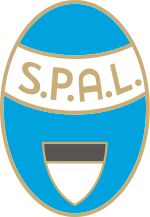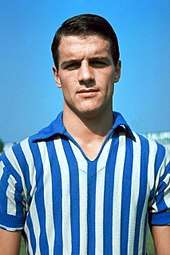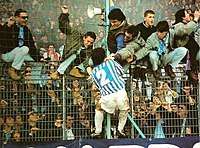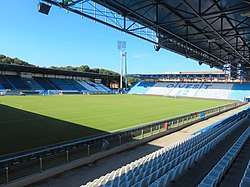S.P.A.L.
S.P.A.L. (Italian pronunciation: [spal]), an acronym for Società Polisportiva Ars et Labor, is a professional Italian football club, based in Ferrara, Emilia-Romagna. The team plays in Serie A, the highest level of the Italian football league system.
 | ||||
| Full name | Società Polisportiva Ars et Labor S.p.A. | |||
|---|---|---|---|---|
| Nickname(s) | Gli Spallini I Biancazzurri (The White and Blues)[1] Gli Estensi (The House of Este) | |||
| Founded | 1907 (as "Società Polisportiva Ars et Labor") 2005 (refounded) 2012 (refounded) | |||
| Ground | Stadio Paolo Mazza, Ferrara, Italy | |||
| Capacity | 16,134 | |||
| Owner | Vetroresina S.p.A. | |||
| Chairman | Walter Mattioli | |||
| Head coach | Luigi Di Biagio | |||
| League | Serie A | |||
| 2018–19 | Serie A, 13th of 20 | |||
| Website | Club website | |||
|
| ||||
Founded in 1907, since 1928 they have played their home matches at Stadio Paolo Mazza, named after Paolo Mazza (chairman of the club 1946–1977).
In total, SPAL have participated in 24 top-tier, 25 second-tier, 41 third-tier, 7 fourth-tier and 1 fifth-tier league seasons. The club's best finish was when they came fifth in the 1959–60 Serie A; they also reached the 1961–62 Coppa Italia final.
The club is owned by Vetroresina S.p.A. and chaired by Walter Mattioli. The current manager is Luigi Di Biagio.
History
From foundation to World War II
The club was founded in March 1907 as Circolo Ars et Labor (latin for Art and Work Club) by the Salesian priest Pietro Acerbis. In the early stages, it was mainly a cultural and religious association, then in 1913 it became a multi-sports company, taking the name of Società Polisportiva Ars et Labor (SPAL). The team began its professional activity under the aegis of the Italian Football Federation (Federazione Italiana Giuoco Calcio) in 1919, competing in the second-tier tournament.
SPAL played in the top flight league from 1920 to 1925, reaching the qualification playoff for the National Finals in 1921–22. From 1925 until the Second World War, they played in Serie B and Serie C: in this period, the club's all-time top striker Mario Romani scored 130 goals in 189 games during two different periods with the white-blues (1925–32 and 1937–38).
Between 1939 and 1943 the club temporarily changed its name to A.C. Ferrara, wearing the black and white colours of the city. After the suspension of the championships due to war, in 1945 the club returned to the name SPAL and to the light blue and white kits.
The golden period in Serie A

In 1946 Paolo Mazza became chairman of the club. After five consecutive seasons in Serie B, SPAL won promotion to Serie A after finishing the championship first in 1950–51. The white-blues subsequently stayed in the top division for most of the 1950s and 1960s, competing in 16 out of 17 Serie A seasons from 1951 to 1968.
SPAL finished fifth in 1959–60, thus obtaining the best finish in its history. Also, in 1961–62 they played in the Coppa Italia final, losing against Napoli. In the early stages of 1962–63 season, in which the club finished in eighth place, the white and blues managed to reach the top of the league table. During those years, the club was a launchpad for many young players who became stars, among them Fabio Capello.
In 1963–64 they were relegated to Serie B, but they came back to Serie A after only one year, and remained in the top division until 1968. At the end of the last season in the top flight, SPAL won the Cup of Italian-Swiss Friendship.
From 1970s to 21st century

During 1970s, 1980s and 1990s SPAL played mostly in Serie B and Serie C/C1.
Paolo Mazza quit the presidency in December 1976 and was replaced by Primo Mazzanti. The former chairman died in December 1981 and three months later Ferrara's Stadio Comunale was named after him.
In 1990, Giovanni Donigaglia became chairman of the club: between 1990 and 1992 SPAL obtained back-to-back promotions from Serie C2 to Serie B, under the management of Giovan Battista Fabbri. Donigaglia left the presidency in 2002 with the squad in Serie C1. He was replaced by Lino di Nardo.
Recent years
The club went bankrupt in 2005,[2] and were reformed as SPAL 1907 S.r.l., under the terms of Article 52 of N.O.I.F..[3] In the summer of 2012, after suffering a second bankruptcy, the club was refounded for the second time as Società Sportiva Dilettantistica Real SPAL and would begin life in Serie D[4] again under Article 52 of N.O.I.F..[5]
At the end of the 2012–13 season the club took back its original name. Giacomense, a club founded in 1967 at Masi San Giacomo, a frazione of Masi Torello, had moved to the city of Ferrara; on 12 July 2013, owner Roberto Benasciutti made a deal with the Colombarini family for a merger between SPAL and Giacomense, with the latter giving its sports title to SPAL and continuing to play in Ferrara. The club changed its name to S.P.A.L. 2013, in order to continue the football history of SPAL. They finished the 2013–14 Lega Pro Seconda Divisione season in sixth place, thus qualifying for the inaugural unified 2014–15 Lega Pro season.
In 2015–16, the squad won promotion to Serie B for the first time since the 1992–93 season, after finishing first in group B of the Lega Pro. The following year they came first in Serie B, thus obtaining promotion to Serie A after a 49-year absence.[6] In their first season back in Serie A, SPAL avoided relegation by finishing in 17th place.[7] At the end of the 2018–19 season they confirmed their presence in the top flight for a third consecutive year, finishing 13th. The club had mixed fortunes in the 2019-2020 season and, after gaining just 15 points in 23 games, coach Leonardo Semplici was dismissed in February 2020, to be replaced by Luigi Di Biagio.[8] SPAL were just two points above bottom-placed Brescia when the Serie A competition was suspended on 08 March due to the coronavirus outbreak.
Colours, badge and nicknames
The team's colours are light blue and white, which derive from the Salesians' emblem. The home kit, since 1962, has been composed of a vertical striped light blue-white shirt, white trainers and white socks. The only exception to light blue and white was when the club adopted a black and white kit between 1939 and 1943 (when it was named A.C. Ferrara), in honour of Ferrara's civic colours.
Currently the badge features an oval-shaped light blue escutcheon, with a white band in the upper section, on which is written the acronym S.P.A.L. in golden characters. Also, in the lower section, the black and white emblem of the city is featured. From 1980 until mid-1990s the official badge featured a fawn, another symbol of the club.
SPAL's most common nicknames are Biancazzurri (from the club colours, light blue and white) and Estensi (from the House of Este, ancient European noble dynasty that ruled Ferrara from 1240 to 1597).
Stadium

- Campo di Piazza d'Armi (1919–28)
- Stadio Paolo Mazza (1928–)
The current home ground of SPAL is the 16,134 seater Stadio Paolo Mazza. The stadium was opened in September 1928 as Stadio Comunale, then took on its current name in February 1982, in honour of the former president of the club Paolo Mazza, who died two months earlier.
Initially it had a capacity of 4,000. Then, in concomitance with the promotion of SPAL to Serie A, in 1951 it was subjected to a heavy restructuring that brought capacity to 25,000. Between 1960s and 1980s it was renovated again, reducing the number of possible spectators to 22,000 until the mid-2000s.
From 2005 to 2016 the capacity was limited to 7,500 due to safety reasons and cost containment. In 2016–17, after the club's promotion to Serie B and then to Serie A, the stadium was restructured again to match the modern needs of comfort and safety. In the summer of 2018 a further remodeling took place, in order to bring the stadium capacity from 13,135 seats to 16,134.[9]
Sponsors
Kit sponsors
|
Official sponsors
|
Players
Current squad
- As of 31 January 2020.[10]
Note: Flags indicate national team as defined under FIFA eligibility rules. Players may hold more than one non-FIFA nationality.
|
|
Out on loan
- As of 31 January 2020
Note: Flags indicate national team as defined under FIFA eligibility rules. Players may hold more than one non-FIFA nationality.
|
|
Others player under contract
- As of 31 January 2020
Note: Flags indicate national team as defined under FIFA eligibility rules. Players may hold more than one non-FIFA nationality.
|
Notable former players
Captains
Below a chronological list of SPAL captains since 1950.
|
|
|
Technical staff
| Position | Staff |
|---|---|
| Head of technical staff | |
| Head coach | |
| Vice coach | |
| Technical assistant | |
| Match analyst | |
| Fitness coach | |
| Goalkeeping coach | |
| Injury recovery | |
| Team manager | |
| Head of medical staff | |
| Team doctor | |
| Physiotherapist | |
| Physiotherapist | |
| Physiotherapist | |
| Physiotherapist |
Chairmen history
SPAL have had several presidents (chairmen) (Italian: presidenti, lit. 'presidents' or Italian: presidenti del consiglio di amministrazione, lit. 'chairmen of the board of directors') over the course of their history. Some of them have been the main shareholder of the club. The longest-serving chairman is Paolo Mazza.
|
Managerial history
SPAL have had many managers and head coaches throughout their history, below is a chronological list of them.
|
|
Honours
Domestic
League titles
Cups
- Coppa Italia
- Runners-up (1): 1961–62
- Coppa Italia Serie C
- Winners (1): 1998–99
- Runners-up (1): 1988–89
- Supercoppa di Lega Pro
- Winners (1): 2016
European
- Cup of Italian-Swiss Friendship
- Winners (1): 1968
Youth
- Campionato Primavera B
- Winners (1): 1964–65
References
- Soattin, Davide (15 April 2020). "La SPAL gioca contro il Coronavirus: tutte le iniziative dei biancazzurri". tuttomercatoweb (in Italian). Retrieved 21 May 2020.
- Hooper, Alasdair (18 August 2017). "Who are SPAL? The incredible rise of Serie A's new boys as club prepare for first top-flight fixture since 1968". talkSPORT. Retrieved 23 March 2018.
- Carraro, Franco (16 August 2005). "Comunicato Ufficiale Nº66/A (2005–06)" (PDF). Consiglio Federale (Press release) (in Italian). Rome: Italian Football Federation. Retrieved 19 January 2018.
- "FIGC registers SPAL in Serie D". il Resto del Carlino (in Italian). 8 August 2012. Retrieved 25 March 2018.
- "First day in school for SPAL: It will return to his real level". estense.com (in Italian). 3 August 2012. Retrieved 25 March 2018.
- "SPAL promoted to Serie A". Football Italia. 13 May 2017. Retrieved 25 March 2018.
- "Serie A basement battle". football-italia.net.
- "Spal: ufficiale l'esonero di Semplici, al suo posto Di Biagio". la repubblica.com (in Italian). 10 February 2020. Retrieved 13 May 2020.
- "SPAL receives boost to further expand stadium". TheStadiumBusiness. 20 December 2017. Retrieved 25 March 2018.
- "Società Polisportiva Ars et Labor – Squadra". spalferrara.it. Retrieved 26 March 2018.